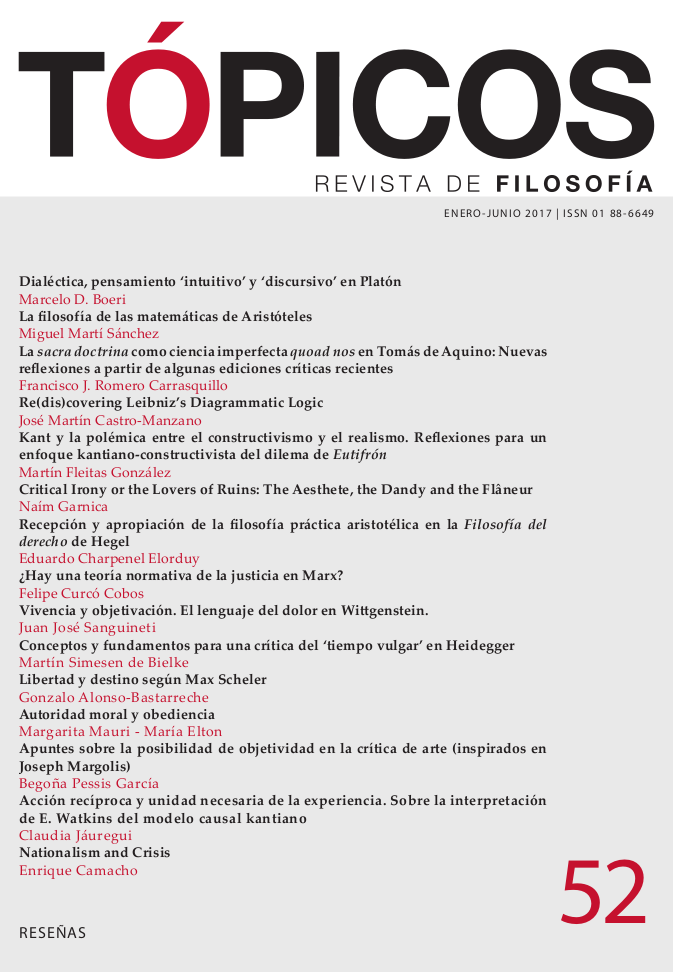Artículos
Publicado 2016-12-27
Palavras-chave
- diagrammatic reasoning,
- diagrams,
- linear diagrams,
- metalogic
Como Citar
Manzano, J. M. C. (2016). Re(dis)covering Leibniz’s Diagrammatic Logic. Tópicos, Revista De Filosofía, 52, 89-116. https://doi.org/10.21555/top.v0i52.760
Resumo
In this paper we recover Leibniz's diagrammatic logic for syllogistic and we discover its computational and logical features by providing a formal approach to it in metalogical terms, which is something that, as far as we know, is yet to be accomplished. Thus, in this contribution we pursue, respectively, two goals, a historical and a logical one: i) to bring more attention on the algorithmic aspects of Leibniz's diagrammatic system for syllogistic, which be believe have been neglected because of a general bias against diagram-based reasoning;and ii) to prove metalogical properties of the system in order to argue that such system is a bona fide logical system.
Referências
- Allwein, G., Barwise, J., & Etchemendy, J. (1996). Logical reasoning with diagrams. New York: Oxford University Press.
- Bellucci, F., Mokte , A. & Pietarinen A. (2013). Diagrammatic Autarchy: Linear diagrams in the 17th and 18th centuries. In Proceedings of the First International Workshop on Diagrams, Logic and Cognition. Kolkata: India. October 28-29.
- Boissonnade, A., Lagrange, J.L. & Vagliente, V.N. (2013). Analytical Mechanics. Springer.
- Bök, A.F. (1766). Sammlung der Schriften, welche den logischen Calcul Herrn Ploucquets betre en. Frankfurt.
- Boole, G. (1951). The Mathematical Analysis of Logic, Being an Essay Towards a Calculus of Deductive Reasoning. Basil Blackwell: Oxford.
- Carnap, R., & Smeaton, A. (1937). The logical syntax of language. London: K. Paul, Trench, Trubner & Co.
- Carroll, L. (1887). The game of logic. (2nd ed.) London: Macmillan and Co.
- Descartes, R., Miller, V.R., & Miller, R.P. (1984). Principles of Philosophy. Springer.
- Dieudonné, J. (2008). Foundations of Modern Analysis. Read Books.
- Karnaugh, M. (1953). The Map Method for Synthesis of Combinational Logic Circuits. Transactions of the American Institute of Electrical Engineers part I, 72 (9), 593–599.
- Kneale, W.C. & Kneale, M. (1962). The Development of Logic. Clarendon Press: Oxford.
- Lambert, J.H. (1764). Neues Organon. Leipzig.
- Larkin, J. H. & Simon, H. A. (1987). Why a diagram is (sometimes) worth ten thousand words. Cognitive Science, 11(1), 65–100.
- Leibniz, G. (1966). Nouveaux essais sur l’entendement humain. Paris: Garnier-Flammarion.
- Leibniz, G., & Couturat, L. (1903). Opuscules et fragments inédits de Leibniz: Extraits des ms. de la Bibliotque royale de Hanovre. Paris: Alcan.
- Lenzen, W. (1990). Das System der Leibnizschen Logik.
- De Gruyter: Berlin. Lenzen, W. (2004). Leibniz logic. In D. Gabbay & J. Woods (eds.) Handbook of the history of logic: The rise of modern logic: From Leibniz to Frege (Vol. 3). Elsevier: Amsterdam.
- Llull, R. (1501). Ars magna. Barch[ino]ne: Impressum per Petru[m]
- Posa. Nakatsu, R. (2009). Reasoning with Diagrams Decision-Making and Problem- Solving with Diagrams. Hoboken: John Wiley & Sons.
- Nelsen, R. (1993). Proofs Without Words: Exercises in Visual Thinking. Mathematical Association of America.
- Newton, I. (1979). Mathematical principles of natural philosophy. A. Motte. (Trans.) University of California Press.
- Murner, T. (1967). Logica memorativa Chartiludium logice, sive totius dialectice memoria, Strasburg, 1509. (Facsimile. ed.). Nieuwkoop: Miland.
- Pagnan, R. (2012). A Diagrammatic Calculus of Syllogisms. Journal of Logic, Language and Information, 21, 3, 347-364.
- Polster, B. (2004). Q.E.D.: Beauty in Mathematical Proof. Wooden Books: New York.
- Tarski, A. (1956a). On the concept of logical consequence. In Logic, semantics, metamathematics; papers from 1923 to 1938. Oxford: Clarendon Press.
- Tarski, A. (1956b). On some fundamental concepts of metamathematics. In Logic, semantics, metamathematics; papers from 1923 to 1938. Oxford: Clarendon Press.
- Tennant, N. (1986). The withering away of formal semantics. Mind & Language, 1(4), 302–318.
- Shimojima, A. (1996). Operational constraints in diagrammatic reasoning. In G. Allwein, J. Barwise, & J. Etchemendy (eds.) Logical reasoning with diagrams. New York: Oxford University Press.
- Shin, S. (1994). The Logical Status of Diagrams. Cambridge University Press: Cambridge.
- Stevin, S. (1586). De beghinselen der weegh const. Leyden.
- Velarde Lombraña, J. (2002). Leibniz y la lógica. Thémata: Revista de Filosofía, 29, 217–231.
- Venn, J. (1880). On the Diagrammatic and Mechanical Representation of Propositions and Reasonings. London, Edinburgh, and Dublin philosophical magazine and journal of science. R. Taylor.






